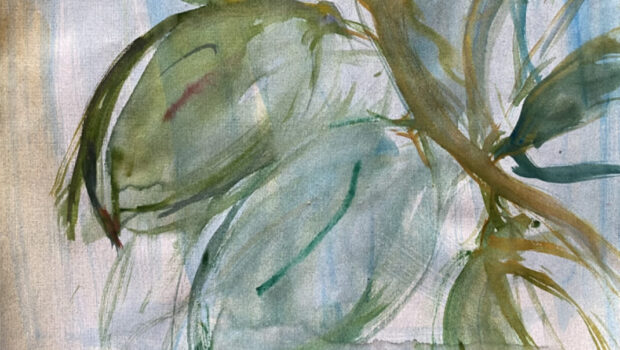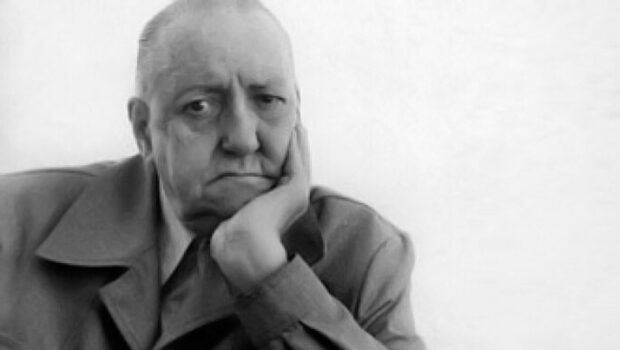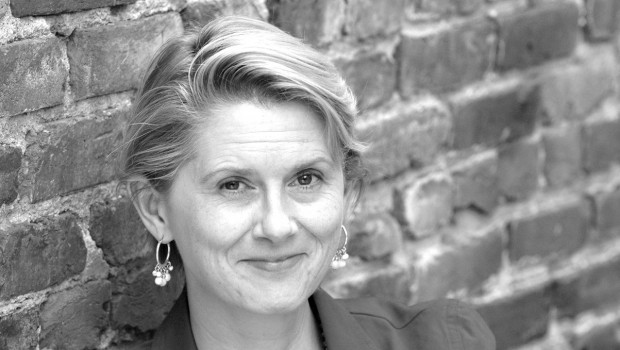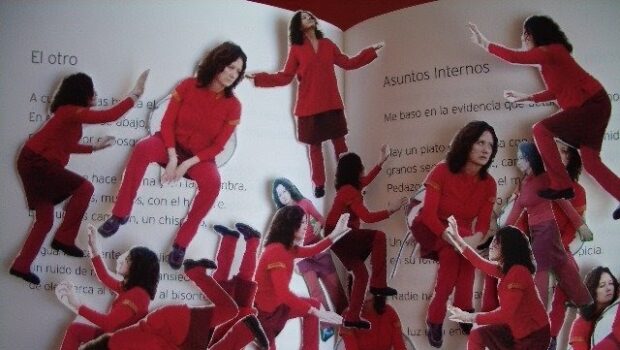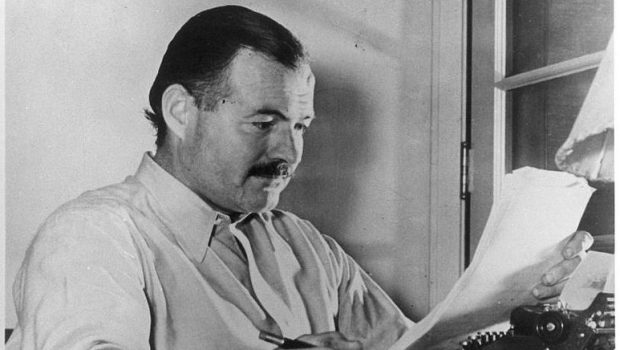The Square Patio
Amparo Dávila
Translated by Sarah Booker
Dusk was falling and from the open patio one could see the twilight so reddened that it looked like fire, or like a purple sea. It was one of those provincial patios, square, with passages and rooms off either side. Horacio was beside me, watching it get dark, and in the corners of the passages, muffled flax remained withdrawn and quiet as if an ancillary chorus, a sordine accompaniment playing in sotto voce. I don’t know if it was because of that bloody sunset or because it was that time in the evening when one is so especially sad, but neither of us talked. All of a sudden I could make out the silhouette of a man outlined against the crimson backdrop like a black knife, fixed on the very edge of the patio cornice. The smallest of movements would have been enough for him to plunge into the depths below.
“He’s going to kill himself,” I told Horacio. “He’s going to kill himself,” I said again, because the man lingered without stepping back, as if he were resolved to throw himself over.
I looked around for Horacio, but he was no longer next to me. I relaxed knowing that he had understood my message and was going to save the man. Anxiously, I waited for him to materialize behind the man; but the minutes passed and Horacio didn’t appear. Meanwhile, twilight floated away in bloody shreds. I then saw Horacio in an identical stance opposite the suicidal man on the other side of the patio: like two daggers face to face, like two pawns on a chessboard.
“He’s going to kill himself,” I said, now hopelessly watching the stranger.
That very moment Horacio plunged into the void. The muffled beings that had remained motionless the whole time let out a savage cry and voraciously descended on the fallen body, covering him with their shadowy and membranous wings.
I turned back, back…
I went into the room where the childhood toys were kept, but that room, always full of dolls, stuffed animals, balls, bears, skates, was now an enormous closet with hangers full of clothing. Upon entering, it was no longer possible to see anything but garments everywhere, as if it were a thrift store, or one of those places where you can rent suits for all occasions. There were hundreds, thousands of beautiful and expensive dresses in the most diverse styles and colors; anything one could desire was there. Enthusiastically, I began to try on everything, but nothing fit me, it was too big or too small, too long, too tight. There was nothing in my size, nothing. I began to give up and to feel truly sorry for myself for not having found anything in my size, but I didn’t give up on my hunt and I tried on dresses and more dresses, and jackets and sweaters and hats, blouses and skirts and négligés. In the midst of it all I heard someone calling my name again and again. I recognized Olivia’s voice drifting towards me from among the clothing.
“Olivia, where are you?” There was no response to my question, but I again heard the same call. “Olivia, Olivia, where are you?”
“Here I am, in the middle of the room,” she finally answered in a soft voice, as if the clothing were suffocating her.
I began to remove garment after garment, trying to part them to clear a path towards her. I was able to make my way through a rack and found another and then another and then another and another, as if the racks were multiplying and would never allow me to reach Olivia. Finally I was able to get out of that world of clothing and to see her dressed all in black, her face was veiled in gauze that was also black. She was standing in the middle of a circle, a tiny circumference that seemed to belong only to her.
“What are you doing here?” I asked her.
She moved forward a step, or none, but I felt that she had directed herself towards me, while her hands lifted the gauze that covered her face.
“I’m dead,” she said, “have you not noticed that I’m dead, that I’ve been dead for a long time?” and upon lifting the veils that covered her, I saw before me a face hole, a cavity where I could see nothing but emptiness. “I’m dead, dead…”
And she continued to slowly advance towards me. I leapt into that jungle of dresses that were now flying and they were black bats and owls and vultures and spider webs that my hands grabbed onto in my flight.
I turned back, back…
I plunged into a room where two older men were seated at a triangular table, reading a large book below the bright white light of a hanging light bulb. My sudden appearance startled them and they looked up from the volume in order to carefully examine me. I noticed that they were reading The Interpretation of Dreams, and thought that it would be a convenient opportunity to ask them something that had been bothering me for a long time. They consented to my plea and then courteously invited me to take a seat at the third side of the table, which was empty.
“A man, always the same one, follows me with an enormous knife every night when I sleep. It’s an indescribable torment the fear with which I live that one day he will catch me and I won’t wake up again,” I tell them.
“I understand this,” said the younger of the two, “I suffer the daily pursuit, constantly, of a cloud of black butterflies that are always with me, no matter where I am. A thick cloud of them looms over my head. If I run, it moves at the same pace, and doesn’t leave me anywhere that I can protect myself and rid myself of it; if follows me tirelessly, like a telltale shadow projected upwards; sometimes I feel it so close to me that I have to carry my hands over my head and run bent over, almost on the ground, to avoid the brush of their wings weighed down with shadowy and rancid dust…”
“Images, symbols, savage persecution,” yelled the older of the two, interrupting the other, “there’s no possible escape from ourselves; the chaos inside is always projected outwards; escape is a path to nowhere… but you don’t have to suffer or torment yourself, we begin the game; the environment is favorable, only the magic endures, the magical thinking, the ethereal spell of the word…”
“Yes, let’s light the fire, one must worship the fire, the red magic, vibrant and blazing,” said the other man while taking out his lighter, and the lighter was a big, metal phallus, polished and shining. The two men lit a fire with everything that was in the room, breaking chairs, benches, piling up cushions, books, and papers that they took out of a large, green filing cabinet.
“Now bring on the black butterflies!” Yelled the younger one, pounding his chest like a caveman. “Yes! Let the black butterflies come and burn their fucking little wings in the ancestral fire, the fire that never dies, the never-ending fire of yesterday, of today, and of tomorrow…”
“These are my childhood memories,” cackled the older one, “Requiescat in pace in you, oh fire! Oh red magic! Oh round and warm womb that aborted us!” as he ripped up yellow papers.
The other man danced around the fire and pulled apart his love letters.
“She loves me, she loves me not, she loves me, she loves me not…”
“Help me,” yelled the older one as he took out an enormous wad of receipts, many of which were postmarked, “let’s burn the rent, the electricity, phone, and gas receipts; the receipts for the prostitutes that we’ve archived in order to create a detailed record of their comings and goings, in order to be disciplined and exact in our sexual and economic accountability, like organized people who live their lives in daylight and keep diaries and agendas.”
I began to get undressed and threw the articles of clothing I took off into the fire as the only thing that I could offer to keep it burning. Completely preoccupied with their work, they only lifted their smoke-coated glasses from time to time and smiled, content with my spontaneous demonstration of collaboration.
“No, not that, not that,” shouted the younger of the two upon seeing that the other was about to throw three folders full of photos into the fire, “not that, never, we must save the porno photos. What would we do later, without them?” He said, lowering his voice until it was only a soft murmur, “what would we do without them on these long, sleepless nights?” Thick tears began to well up in his eyes, “you must understand that our imagination is no longer an impulsive virgin but an old woman that gets tired and must ask for help to cross the street…”
“Fine, we’ll save the porno photos,” said the older one, totally convinced by his friend’s heavy tears and prudent reasoning.
“Let’s save the porno photos, matarili, rili, rili, matarili, rili, ron,” we then sang, the three of us holding hands around the fire, “matarili, rili, rili, matarili, rili, ron, what do you want, matarili, rili, ron?”
I started to cough without being able to stop because the dust from the burning wings of the black butterflies got into my throat, and the smoke began to suffocate me. Without saying goodbye to them, I opened the door and I left.
I turned back…
I found myself in a huge room full of books, something like a huge library or a bookstore under renovation, as the volumes were piled up on the floor and benches, and the shelves were empty. There were books everywhere. A skinny, pale boy was dusting them with an orange feather duster, but he did nothing to put them back on the shelves. Upon seeing me, he approached me and asked if I was looking for a book.
“I’ve been looking for the Rabinal Achí,” I answered.
“The Rabinal Achí?” He asked, surprised.
“Yes, the Rabinal Achí.”
“It’s really quite absurd to want to read the Rabinal Achí without any preparation, just like that,” he said, very seriously, while scratching his chin with a long, yellowish finger; “no, it isn’t possible.”
“Could you tell me why?”
“But… you don’t know that in order to read this book, it’s necessary to have reached a higher state, a state of elevated cerebral purity?”
“I’ve never heard that, nor does it concern me,” I retorted, carefully choosing my words. He shrugged his shoulders and kept staring at me, “and what kind of purity is required to be able to read it?” I asked, now with a friendlier tone.
“The achievement is based on daily and arduous spiritual and corporeal discipline,” he said curtly, and continued to dust books.
“And this, how does one acquire it, through what practices?”
“Well, it’s really complicated to explain, it would take a long time,” and he left to attend to a gentleman who had come in. I was left without knowing what to think, shocked and bothered by the pale boy’s attitude. Almost at the same time he returned and said to me:
“I can recommend Hatha Yoga to start your training, or merely as a simple initiation step.”
“Hatha Yoga? That doesn’t seem to be anything extreme. You should know that for years I have stood on my head every morning upon waking up.”
“That’s nothing,” he said, sarcastically, “When you can do this, we’ll talk,” he added while he elevated almost a meter off the ground and placed a book on the highest shelf. “Or this,” he added as he breathed in through his nose and held himself above the ground with just the index finger of his left hand; his entire body was a straight line with his feet in the air and his head facing down, without touching the ground.
“Not so easy, huh?” He said, as he returned to his normal position.
“And how much does the Rabinal Achí cost?” I thought to ask, now really annoyed by the marked impertinence of that boy who was so skinny and pale.
“What do you mean how much does this book cost? You cannot buy it, ma’am.”
I looked in my bag to see how much I had on me and saw that I had almost twenty dollars.
“I have enough money to buy that book and any others that you might like.” I answered him, enunciating my words.
“It doesn’t have anything to do with money, ma’am. You don’t understand…”
“Well then, how can I…?”
“It has no material value, I’ve told you; one must deserve or win it, rescue it, if you will”
When he realized that I didn’t understand anything, he said in a more cordial tone:
“Come with me, I’ll show you where to find the Rabinal Achí.”
I followed him and we went into another room that had a pool in its center.
“Look at the bottom.”
At the bottom of the pool, which was illuminated as if it were a showcase, were many books. The phosphorescent letters of the titles danced in the water: r…a…b…i…n…a…l…a…ch…í… yes, Rabinal Achí, there it was.
“But what are those books doing in the pool?” I asked, surprised. “Won’t they get wet?”
“Nothing will happen to them, water is their element and they’ll stay there for a long time until someone comes along who deserves them or dares to rescue them.”
“Why don’t you fish one out for me?”
“Why don’t you go get it yourself?” He said, looking at me with a mocking gaze that I found impossible to bear.
“Why not?” I answered, as I dove into the pool.
Upon jumping in I had thought that it was about two meters deep and that with a single dive I would reach the bottom, but the pool was much deeper than I had thought and the books were much deeper than I had calculated. I kept going and when I thought my hands would touch the books, I realized that they were even farther below, still more, so I kept going deeper and deeper, even farther, in the illuminated and phosphorescent water, until I felt that I was almost out of air, that I only had enough to get out and breathe. So I began to swim towards the surface as fast as I could, no longer wanting books or anything but to breathe, to breathe deeply, to fill my lungs, to breathe once more, once more, and I climbed and climbed still without air, desperate to breathe in a little air, air, air… until my hands hit against something hard and metallic, something like a lid, like the lid of an enormous sarcophagus.
*Cover Image by Tammie Dickerson
 Amparo Dávila is the author of Salmos bajo la luna (1950), Perfil de soledades (1954), Tiempo destrozado (1959), Música concreta (1964), Árboles petrificados (1977), Muerte en el bosque (1985) among other titles.
Amparo Dávila is the author of Salmos bajo la luna (1950), Perfil de soledades (1954), Tiempo destrozado (1959), Música concreta (1964), Árboles petrificados (1977), Muerte en el bosque (1985) among other titles.
Posted: October 20, 2015 at 9:42 pm



